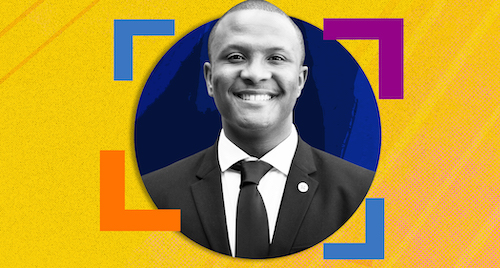
A few Fridays ago, a grandmother came in for a doctor’s appointment at Western Wayne Family Health Centers in Inkster. She got the typical 20 minutes with the physician. But afterward, she spent another hour and a half with community health worker and graduating UM-Dearborn CEHHS senior David Fuller Jr. They talked about how overwhelming it’s been to work two jobs, all while taking care of her kids and grandkids. She opened up about the anxiety and depression she’s been feeling since the pandemic started. And aside from listening, Fuller did what he could to ease the strain. By the end of their time together, he had connected her with additional food assistance and a free therapist. He even stayed late past the end of his shift to get a hold of someone in human resources, who is helping her apply for a better job.
Being able to focus not only on people’s acute health needs, but on the social factors that influence their health is one of the main reasons Fuller made the switch to public health from his initial pre-med track. “Preventative healthcare has always made a lot of sense to me, and I think public health, in many ways, ecompasses that on a very large scale,” Fuller explains. “When you’re talking about health policies, and public health initiatives and practices that you can implement across a population, then you’re talking about doing so much more than helping an individual manage a chronic condition. You’re talking about macro-level ripple effects that benefit entire communities.”
The pandemic has made this textbook articulation of the public health philosophy even more of a living truth for Fuller. Both in his work at the clinic and in his other role as a COVID-19 contact tracer, he’s witnessed the positive impact public health initiatives can have on communities. In the case of COVID-19, those policies have literally saved lives. But he also hopes the public is coming away from this historic experience with broader lessons about the state of healthcare in America, particularly its deep inequities that have been put on full display. “Health equity has always been, to me, the core of where we need to start when we talk about improving our healthcare system and implementing health policies,” Fuller says. “We can be the greatest country in the world in terms of medical technology and healthcare services, but if we don’t address all the other social determinants of health, we’re going to continue to overwhelm our system and have poor population health outcomes. So we have to understand that how we choose to form our policies and systems has a huge impact on the health of our communities.”
Fuller sees public health workers as playing a pivotal role in finally realizing a healthcare system that serves everyone, and he sees his particular contribution as coming from the top. After he graduates in a few weeks with his Bachelor of Science in Public Health, he’s planning on pursuing a master’s in health services administration, with his first choice being the renowned program at UM-Ann Arbor.
“I think my generation is going to be the one to lead this change,” Fuller says. “We are the ones protesting in the streets. We understand that justice and equity have to be part of the way forward on so many fronts. My generation has already seen a lot — and the pandemic is just adding another layer to that. So I think the lessons we’ve learned are going to stay with us and shape how we see the world for a very long time."





